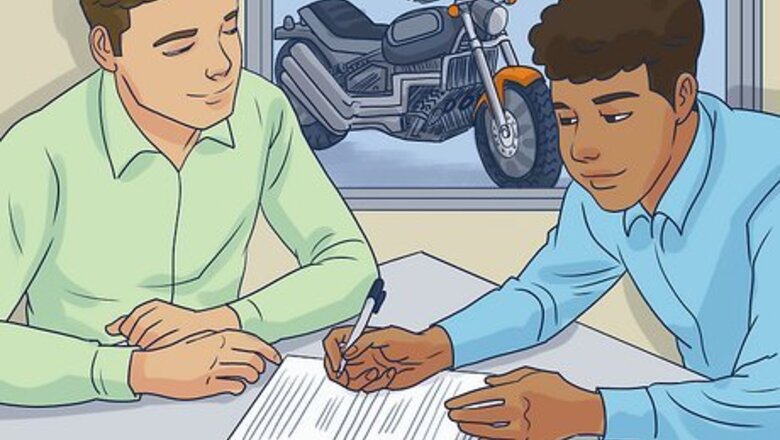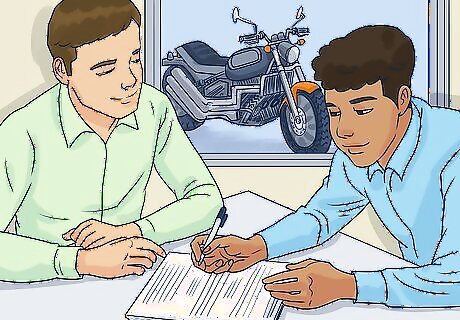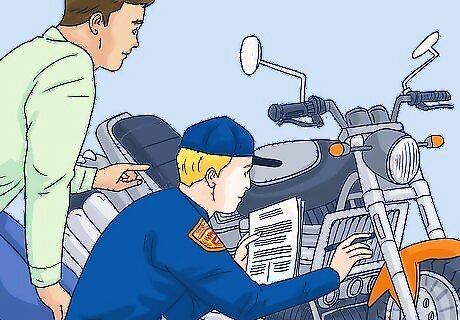
views
- Fill out the title application form found on your state’s DMV website. For used motorcycles, also ask the previous owner to transfer their title to you.
- Provide your bill of sale, which details who the seller and buyer of the motorcycle are, the make and model of the motorcycle, and when it was purchased.
- Mail or bring your documents to your local DMV. Pay for the title and any other associated fees when you submit your application.
- If your motorcycle doesn’t have a title, ask the previous owner to get a duplicate title. If there is no title, see if your state DMV uses bonded title transfers.
Obtaining a Motorcycle Title

Get the motorcycle’s original title from the previous owner. If you’re buying a used motorcycle, ask the seller to transfer the title to you. The previous owner of the motorcycle still has their title, so they need to sign it over to you to show that you now own the motorcycle. In most states, a title is necessary to register your motorcycle and legally drive on the road. Check if your state’s DMV requires titles for motorcycles. Some states, like Vermont, don’t require titles for motorcycles with engines smaller than 300 cc. In Maine, you don’t need a title if your vehicle was made in 1994 or later. When you buy a motorcycle from a dealership, they usually take care of the title for you.

Complete your state’s title application form. Simply navigate to your state’s DMV website and search for “Application for title” or “Title application form.” Then, download the form and fill in the necessary information. Title applications vary state-to-state, so make sure that you use the one for the state you legally reside in. Most forms ask for your name, the vehicle identification number (VIN) on the motorcycle, and its make and model. Complete this form as quickly as you can. Most states require that you submit your form within 10 to 30 days of purchasing your motorcycle. Check your DMV’s site for your state’s specific timeline. If you’re filling out a paper form, stick to using black or blue ink. If you make any mistakes, don’t use white-out to fix them. Just print and complete a new form.

Provide the bill of sale for the motorcycle. When you apply for a motorcycle title, the DMV wants to know the names of who sold and bought the vehicle, the make and model of the motorcycle, how many miles were on it, and when you purchased it. This is all listed on a bill of sale, which you typically complete with the seller when you buy a motorcycle. Check what information your state needs to see on a bill of sale. Some states provide their own bill of sale forms, while in others you’ll need to write your own. Some state’s want the bill of sale to be notarized. Just check your DMV’s website to see if it’s necessary.

Bring a copy of your insurance if your state requires it. Some DMVs need to see that you have insurance when you’re getting a title for a used motorcycle. It’s also common to register your motorcycle when you apply for a title, so it’s a good idea to have your insurance on hand. Most DMVs want proof of insurance at registration. When registering your motorcycle, you might need other identifying information like your driver’s license. Check your state’s DMV website to see what else you need to bring.

See if you need a VIN inspection when buying out-of-state. If you bought a used motorcycle from a different state, your state’s DMV might want to make sure that it has a valid VIN. Each motorcycle has a unique VIN, so the DMV is just checking that the motorcycle’s VIN matches the previous title. This also protects you, as it checks that the motorcycle isn’t stolen. Many states do a VIN inspection when you submit your title paperwork at the DMV. These typically cost a small fee, as little as $7. Your state’s DMV might also require a safety or equipment inspection. To do this, you’ll usually take your motorcycle to an inspection site where an inspector verifies the VIN, odometer reading, and ensures that your bike is safe to ride. They’ll complete a form that you submit with your title application.

Pay for the title and any additional fees. Unfortunately, obtaining a motorcycle title isn’t completely free. The amount you have to pay depends on the state, but most title fees range from $30-100. Just check what fees are associated with getting a title on your DMV’s website. If your motorcycle is used, your state might ask that you pay a tax for transferring the title, too. If you're also registering your motorcycle, you’ll have to pay fees for registration and getting a license plate. Some states require that you pay sales tax on the motorcycle when you title it, too.

Mail or take your title application and other documents to the DMV. Most states ask that you bring your title documents to your local DMV office, where an employee will look them over and submit them for you. If you prefer to stay out of the DMV, just look up where to mail your forms on their website. Most DMVs mail your title certificate directly to your house once it’s approved. The approval process can take several weeks, depending on the state. If you haven’t gotten your title after 90 days, contact your state’s DMV. They’ll look up your information to get your title certificate sorted.
Solutions for Untitled Motorcycles

Ask the previous owner to request a duplicate title. It’s common for titles to get misplaced or lost, so luckily the DMV provides copies of the original title. For most states, the current owner has to be the one to request a copy. Just ask them to go to their state’s DMV website to fill out and submit an application for a duplicate title. Be wary of buying a motorcycle without a title. The previous owner might have misplaced the title, but there is the possibility that the motorcycle is stolen. To check that the motorcycle isn’t stolen, run a search using the National Insurance Crime Bureau’s VIN check website.

See if your DMV uses bonded title transfers when a title isn’t available. In some cases, the previous owner might not have a title at all. Because a previous owner can’t be established, purchasing a bonded title protects you as the owner of the motorcycle. If your state offers bonded titles, you’ll typically fill out an application to determine your eligibility and then purchase a surety bond. This is often the case when you’re buying a motorcycle from someone who lives in a state that doesn’t require motorcycle titles. Surety bonds typically cost around $100, though the price depends on the value of the motorcycle.
What is a title?

A title is a certificate proving that you are the owner of the motorcycle. This document is issued to you by the government and ensures that you are the legal owner of your vehicle. It’s also necessary to have a title in order to ride your motorcycle. A title is used to register your motorcycle to you, which allows you to legally ride your motorcycle on public roads.















Comments
0 comment